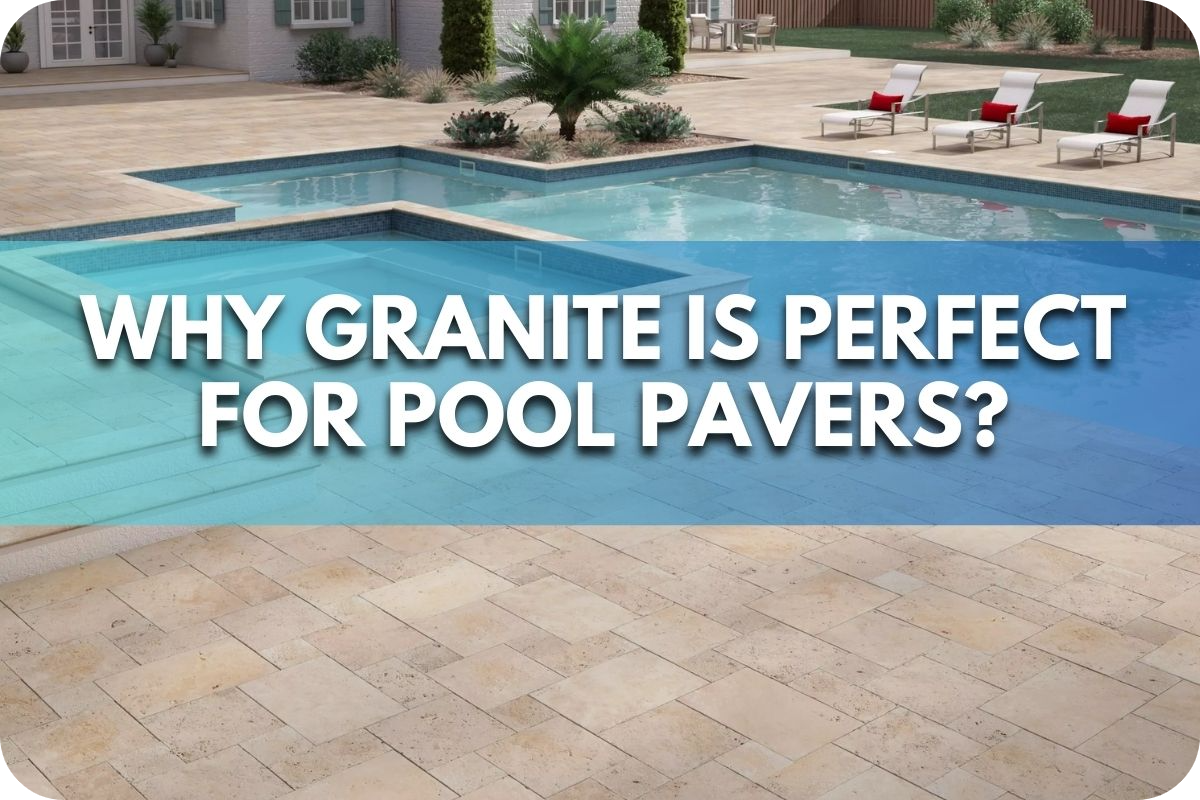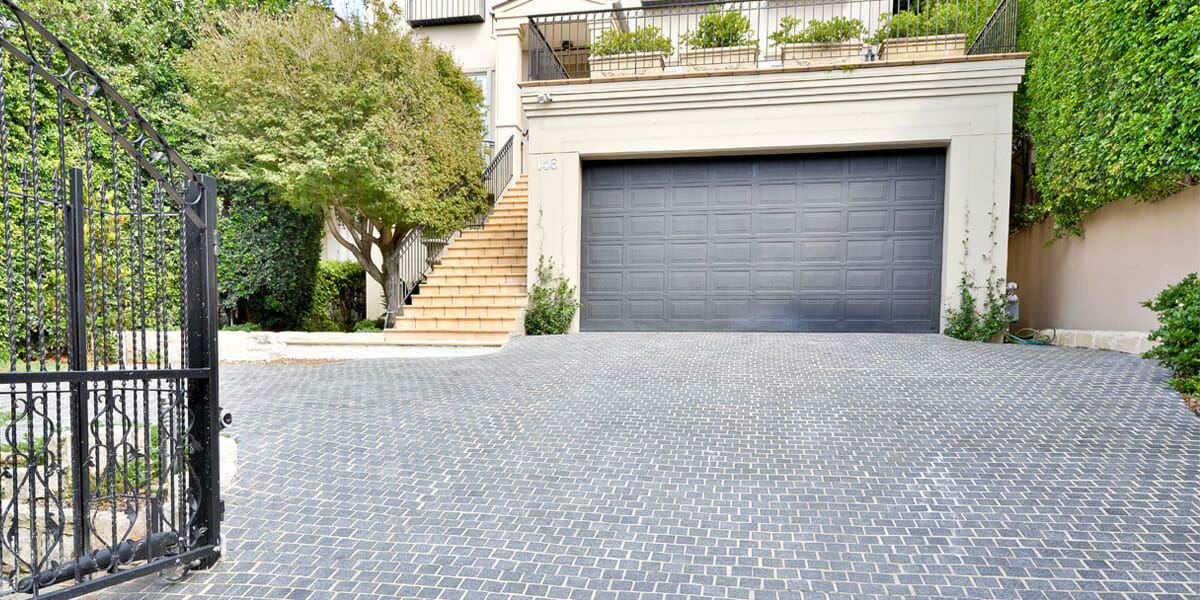
Choosing the right material for pool pavers can be challenging, given the need for durability, safety, and aesthetics.
Many materials fail to meet all these criteria, leading to slippery surfaces, quick wear and tear, and a lacklustre appearance that detracts from the pool area’s appeal.
Granite is the perfect solution for pool pavers, offering exceptional durability, slip resistance, and timeless beauty. This article explores why granite is the ideal choice for ensuring a safe and stunning poolside environment.
What is Granite?
Granite is a natural igneous rock formed from the slow cooling of molten magma deep within the Earth’s crust.
Renowned for its strength and durability, it comprises quartz, feldspar, and mica, which give it a unique speckled appearance and a wide range of colours, from soft greys to vibrant blacks.
This natural composition makes granite incredibly tough and resistant to wear, making it an ideal choice for outdoor applications like pool pavers.
For poolside areas, granite stands out due to its slip-resistant texture, ensuring safety in wet conditions. Its non-porous surface resists water absorption, reducing the risk of damage and ensuring long-term durability in high-moisture environments.
Granite’s natural resistance to heat means it stays cool underfoot, even in direct sunlight, providing comfort around the pool. Additionally, its timeless beauty and variety of colours and finishes allow it to blend seamlessly with any pool design, adding elegance and functionality to outdoor spaces.
Key Benefits of Using Granite for Pool Pavers
Granite is a premium choice for pool pavers, offering a combination of durability, functionality, and aesthetic appeal. Here are the key benefits:
1. Durability
Granite is one of the toughest natural stones, built to last even in high-traffic areas like pool decks. It resists cracking, chipping, and wear, ensuring a long lifespan.
Its strength makes it ideal for handling the pressures of outdoor environments, providing a reliable surface that won’t degrade easily. This durability translates to fewer repairs and long-term cost savings for homeowners.
2. Safety
Safety is a paramount concern around pool areas, and granite excels. Its naturally rough surface provides excellent slip resistance, reducing the risk of falls and injuries in wet conditions.
This non-slip property is particularly beneficial for poolside applications where water is constantly present. Granite’s safety benefits make it an excellent choice for families with children or public pool areas where safety is a top priority.
3. Low Maintenance
Granite pool pavers are incredibly low-maintenance, a significant advantage for busy homeowners. The stone’s dense composition makes it resistant to staining and fading, even with constant exposure to water and sunlight.
Cleaning granite is straightforward; regular sweeping and occasional rinsing with water is usually sufficient to keep the pavers looking pristine.
A mild detergent and a soft brush can be used for tougher stains without damaging the surface. The low upkeep requirements make granite a practical and cost-effective choice for pool areas.
4. Aesthetic Appeal
Granite offers a wide range of colours and finishes, allowing for customisation to suit any design preference. From subtle greys and whites to striking blacks and blues, granite can complement various landscaping themes and architectural styles.
The stone’s natural beauty enhances the visual appeal of pool areas, creating a luxurious and inviting atmosphere.
Polished, honed, or flamed finishes add different textures and appearances, further enhancing granite’s aesthetic versatility.
5. Design Flexibility with Granite
Granite offers remarkable design flexibility, making it ideal for customising pool pavers to suit any aesthetic preference. With various patterns and installation styles, granite pavers can be arranged in numerous ways to create visually appealing designs.
Traditional patterns such as herringbone, basket weave, or running bond provide classic looks, while random or irregular patterns can add a more organic and natural feel to your pool area.
6. Aesthetic Versatility
Available in a stunning variety of colours, patterns, and finishes, granite allows for customisation to match any design preference. Whether you’re aiming for a modern aesthetic or a natural, rustic look, granite seamlessly blends into your outdoor decor. Its timeless elegance adds sophistication and enhances the overall value of your property.
7. Eco-Friendly Choice
Granite is an environmentally sustainable material, sourced directly from nature. Its longevity reduces the need for frequent replacements, and it can be recycled or repurposed when no longer needed. Choosing granite for pool pavers combines luxury with environmental responsibility, making it a smart choice for eco-conscious homeowners.
Installation Considerations
Installing granite pool pavers requires thoughtful planning and precise execution to maximise their durability, safety, and aesthetic appeal. Here are the key considerations:
1. Base Preparation
A strong foundation is critical for ensuring the longevity of granite pavers. The installation site must be levelled and compacted to prevent uneven settling over time. A base layer of crushed stone or gravel is often added to enhance drainage and stability, providing a solid foundation for the pavers.
2. Proper Spacing
Granite pavers should be spaced evenly to accommodate joint material like sand or polymeric sand. Proper spacing not only enhances the visual appeal but also prevents pavers from shifting. Joints should be sealed or filled with material that resists weeds and erosion while allowing for minor natural movement.
3. Drainage Planning
Good drainage is essential to prevent water from pooling around the pool area. Slightly sloping the pavers away from the pool ensures water flows into designated drainage areas. Poor drainage can lead to water damage and compromise the structural integrity of the pavers over time.
4. Choosing the Right Finish
Select a finish that enhances safety and matches your aesthetic goals. Flamed or honed granite provides a slip-resistant surface, ideal for wet poolside conditions. Polished granite, while visually stunning, may not offer the same level of grip and is better suited for decorative areas.
5. Sealing the Pavers
Although granite is naturally durable, sealing the pavers adds an extra layer of protection against stains, chemicals, and weathering. Use a high-quality penetrating sealant to maintain the stone’s natural beauty while enhancing its resistance to moisture and UV rays. Resealing every 1–3 years is recommended for optimal performance.
6. Edge Restraints
Installing proper edge restraints prevents the pavers from shifting or spreading over time. Strong edge supports keep the pavers locked in place, maintaining the structure’s integrity, especially in high-traffic areas.
7. Professional Installation
Granite is a heavy and dense material that requires specialised tools and expertise for precise cutting and placement. Hiring a professional installer ensures the project is completed efficiently and to the highest standards, avoiding costly mistakes.
Maintenance Tips for Granite Pool Pavers
Maintaining granite pool pavers is straightforward, ensuring they retain their beauty and functionality for years. Here are essential tips for routine maintenance:
- Regular Cleaning: Sweep the pavers regularly to remove dirt, leaves, and debris that can accumulate on the surface. This prevents scratches and keeps the pavers looking pristine.
- Washing: Use a garden hose or pressure washer set to a low setting to rinse off dirt and grime. Mix a mild detergent with water and scrub the pavers with a soft brush for deeper cleaning. Rinse thoroughly to remove any soap residue.
- Stain Removal: Address spills immediately to prevent staining. A mixture of baking soda and water can be effective for organic stains like food or drink. Apply the paste to the stain, let it sit for a few minutes, then scrub and rinse.
- Sealing: Although granite is highly durable, applying a sealant once every 1-2 years can provide extra protection against stains and moisture absorption. This is particularly important in pool areas where the pavers are constantly exposed to water.
Conclusion
Granite pool pavers offer unmatched durability, slip resistance, and timeless beauty, making them a standout choice for any poolside. Elevate your outdoor oasis with this versatile natural stone.
Ready to transform your pool area? Contact Splendour in Stone today for premium granite pavers and expert advice to bring your vision to life!
More To Explore

Grey Granite Cobblestones for Driveways: Strength and Style
Grey granite cobblestones combine strength, safety, and timeless appeal, making them a popular choice for Melbourne driveways and outdoor spaces. Their natural flamed texture offers

Granite Wall Cladding Melbourne: Modern and Classic Appeal
Granite wall cladding brings both modern sophistication and classic charm to Melbourne architecture. Known for its durability and natural beauty, granite transforms façades, feature walls,


